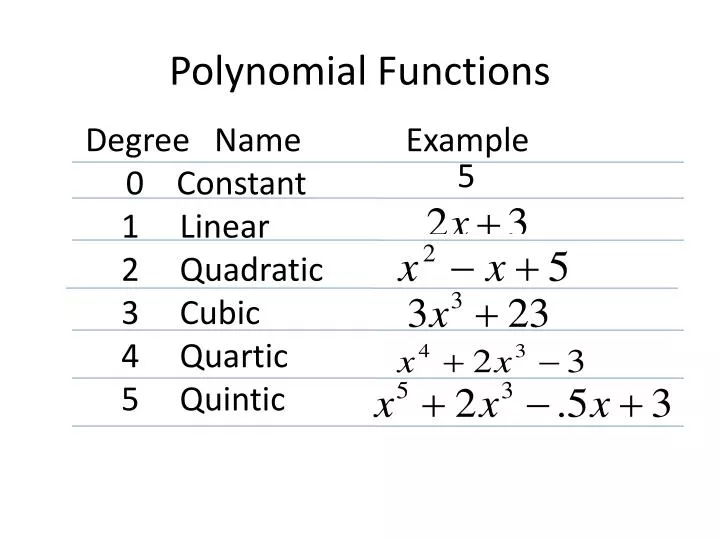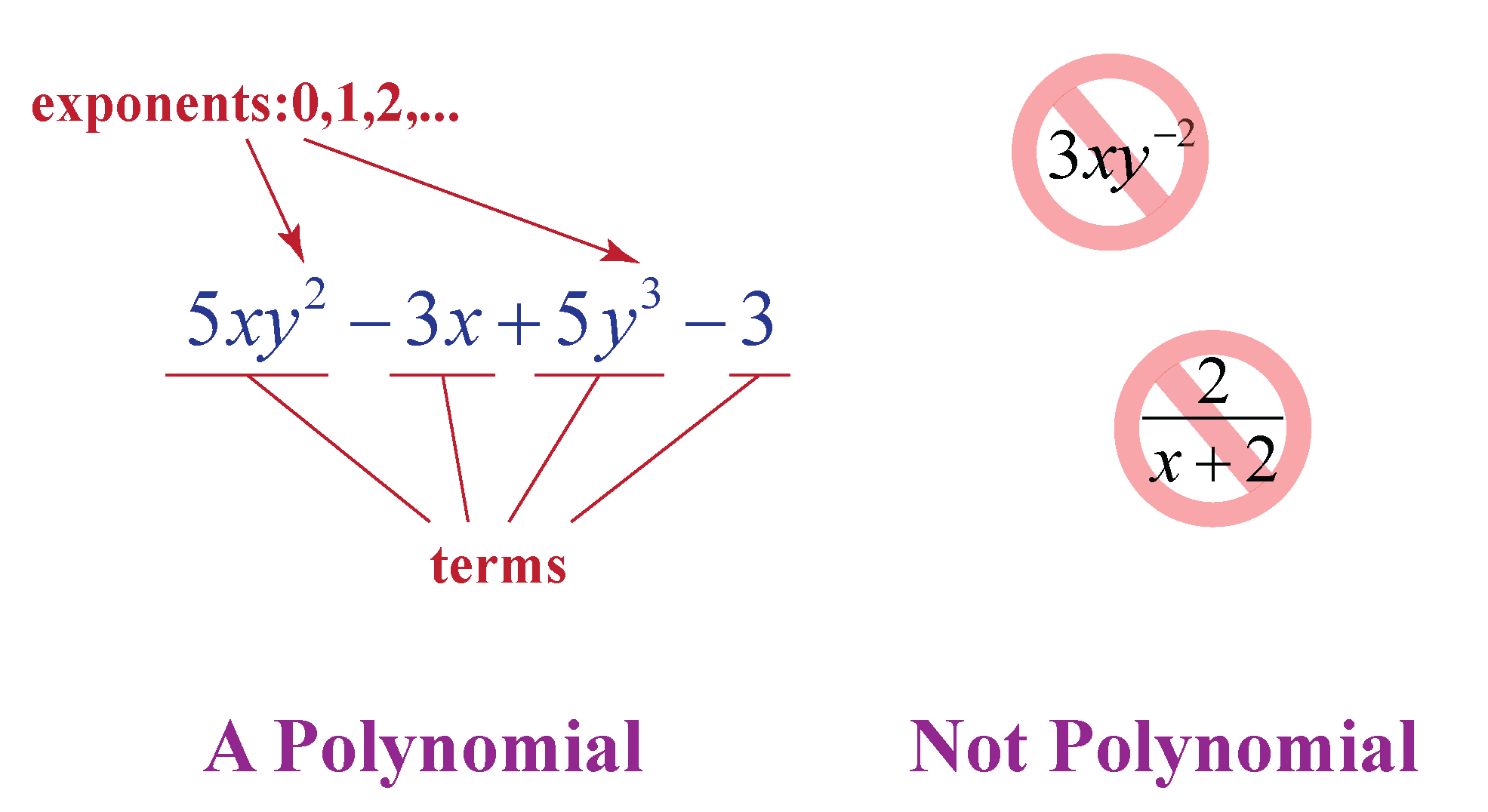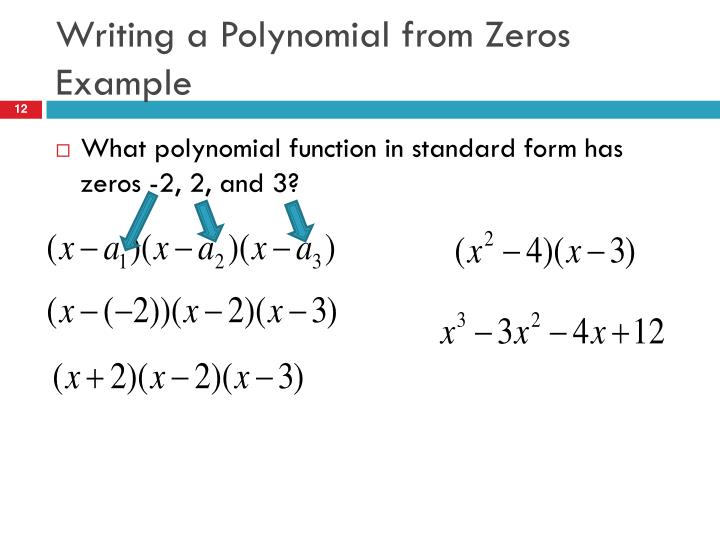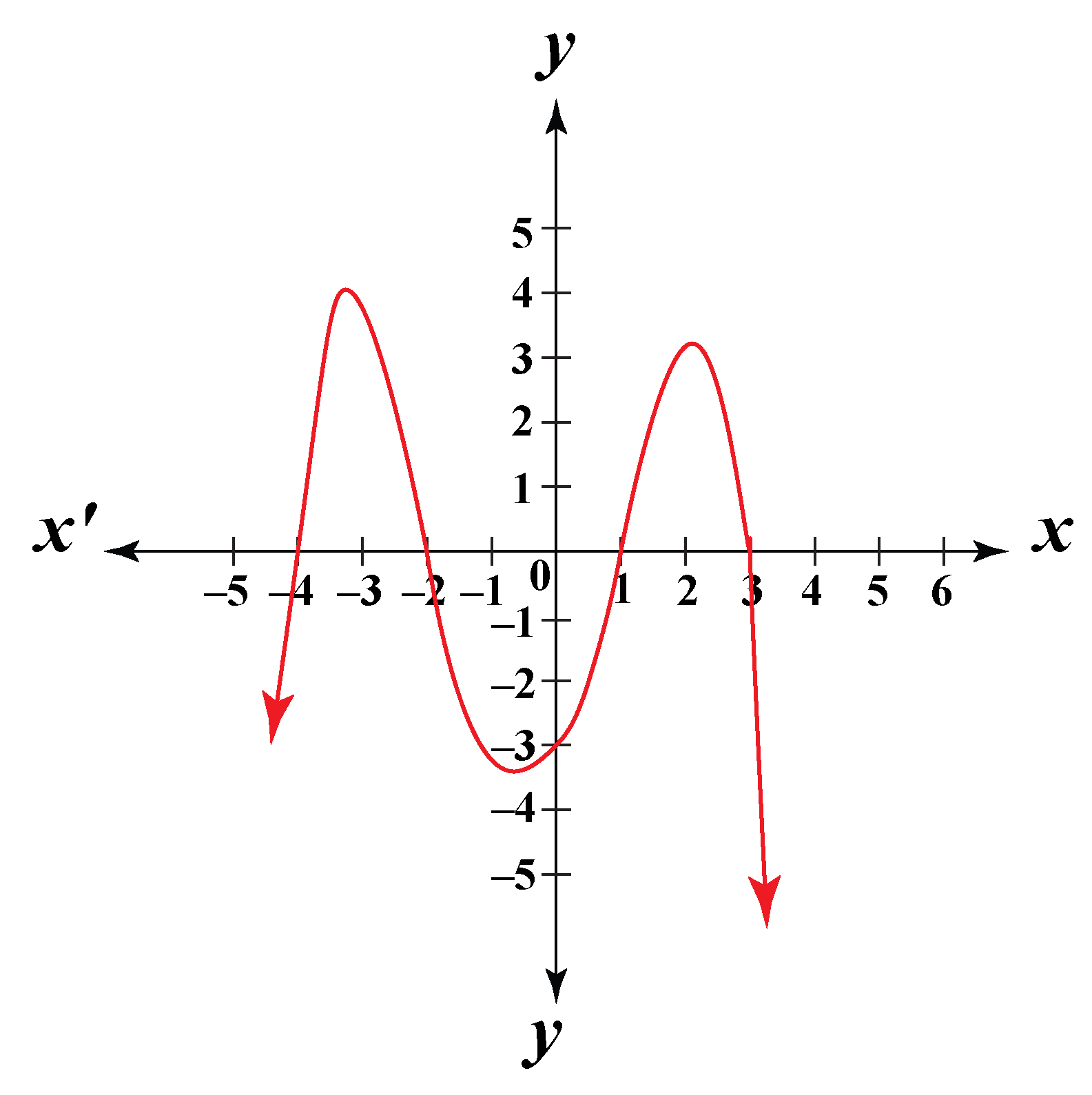General Form Of A Polynomial
General Form Of A Polynomial - Web this is called the general form of a polynomial function. Polynomials can be added using the associative law of addition (grouping all their terms together into a single sum), possibly followed by reordering (using the commutative law) and combining of like terms. Web the equations formed with variables, exponents and coefficients are called as polynomial equations. Write the polynomial in standard form. Web the three most common polynomials we usually encounter are monomials, binomials, and trinomials. It can have any degree. Web first note, a trinomial is not necessarily a third degree polynomial. Web to prove the roots of the linear polynomial formula, let us consider the general form of a linear polynomial p (x) = ax + b, where a and b are real numbers with a ≠ 0. Each a i a i is a coefficient and can be any real number, but a n ≠ a n ≠. F ( x) = a n x n + a n − 1 x n − 1 + a n − 2 x n − 2 +.
Web to prove the roots of the linear polynomial formula, let us consider the general form of a linear polynomial p (x) = ax + b, where a and b are real numbers with a ≠ 0. (you can also see this on the graph) we. Web steps for the subtraction of polynomials. A quadratic function is the polynomial function defined by a quadratic. Web the three most common polynomials we usually encounter are monomials, binomials, and trinomials. Web first note, a trinomial is not necessarily a third degree polynomial. Web yes, if α ∈ f α ∈ f, then by f(α) f ( α) we just mean the polynomial obtained by replacing each occurence of x x by α α. Each a i a i is a coefficient and can be any real number, but a n ≠ a n ≠. Web the general form to represent the polynomial is as follows: Web this is called the general form of a polynomial function.
Web first note, a trinomial is not necessarily a third degree polynomial. Web a homogeneous polynomial in two or more variables. It can have any degree. It can have different exponents, where the higher one is called the degree of. Web this is called the general form of a polynomial function. A third degree polynomial is called a. Each expression a i x i a i x i is a term of a. Web a root is when y is zero: And that is the solution: Web the general form to represent the polynomial is as follows:
nth Degree Polynomial General form Concept & Solved Examples Cuemath
+ a 1 x + a 0 here, a 0 ,….a n is a constant x is a variable types of. Web a root is when y is zero: A quadratic function is the polynomial function defined by a quadratic. Each expression a i x i a i x i is a term of a. Web the general form of.
General form of a Polynomial/part 2/class 10/Polynomial/ncert
A homogeneous polynomial in two or more variables. Web a polynomial of degree n is a function of the form f(x) = a nxn +a n−1xn−1 +.+a2x2 +a1x+a0 where the a’s are real numbers (sometimes called the coefficients of the. It can have any degree. Web to prove the roots of the linear polynomial formula, let us consider the general.
PPT Polynomial Functions PowerPoint Presentation, free download ID
Web this is called the general form of a polynomial function. Web a polynomial of degree n is a function of the form f(x) = a nxn +a n−1xn−1 +.+a2x2 +a1x+a0 where the a’s are real numbers (sometimes called the coefficients of the. For example, if and then the sum Subtract 1 from both sides: F ( x) = a.
nth Degree Polynomial General form Concept & Solved Examples Cuemath
2x + 3 = 0,. + a 1 x + a 0 here, a 0 ,….a n is a constant x is a variable types of. And that is the solution: Polynomials can be added using the associative law of addition (grouping all their terms together into a single sum), possibly followed by reordering (using the commutative law) and combining.
Polynomial functions
Web first note, a trinomial is not necessarily a third degree polynomial. Web yes, if α ∈ f α ∈ f, then by f(α) f ( α) we just mean the polynomial obtained by replacing each occurence of x x by α α. A homogeneous polynomial in two or more variables. + a 1 x + a 0 here, a.
PPT Polynomials, Linear Factors, Zeros PowerPoint Presentation ID
Web the equations formed with variables, exponents and coefficients are called as polynomial equations. It can have any degree. Web first note, a trinomial is not necessarily a third degree polynomial. Polynomials can be added using the associative law of addition (grouping all their terms together into a single sum), possibly followed by reordering (using the commutative law) and combining.
Polynomial Functions Types Graph Solved Examples Cuemath
These are the polynomial equations with degree 1. For example, if and then the sum And that is the solution: Web a root is when y is zero: A homogeneous polynomial in two or more variables.
Polynomial functions
A trinomial is a polynomial with 3 terms. Each expression a i x i a i x i is a term of a. And that is the solution: Web first note, a trinomial is not necessarily a third degree polynomial. Web the equations formed with variables, exponents and coefficients are called as polynomial equations.
nth Degree Polynomial General form Concept & Solved Examples Cuemath
It can have any degree. Divide both sides by 2: And that is the solution: Web types of polynomial equations linear equations. Write the polynomials vertically (one below the other) such that terms are.
Web A Homogeneous Polynomial In Two Or More Variables.
Web the general form of a polynomial function with degree n is: A homogeneous polynomial in two or more variables. Web in mathematics, a quadratic polynomial is a polynomial of degree two in one or more variables. A trinomial is a polynomial with 3 terms.
Web The General Form To Represent The Polynomial Is As Follows:
Web the three most common polynomials we usually encounter are monomials, binomials, and trinomials. Positive or zero) integer and a a is. F ( x) = a n x n + a n − 1 x n − 1 + a n − 2 x n − 2 +. A third degree polynomial is called a.
2X + 3 = 0,.
Divide both sides by 2: Each a i a i is a coefficient and can be any real number, but a n ≠ a n ≠. Web a polynomial of degree n is a function of the form f(x) = a nxn +a n−1xn−1 +.+a2x2 +a1x+a0 where the a’s are real numbers (sometimes called the coefficients of the. Polynomials can be added using the associative law of addition (grouping all their terms together into a single sum), possibly followed by reordering (using the commutative law) and combining of like terms.
Each Expression A I X I A I X I Is A Term Of A.
Web types of polynomial equations linear equations. These are the polynomial equations with degree 1. Monomials are polynomials that contain only one term. For example, if and then the sum









